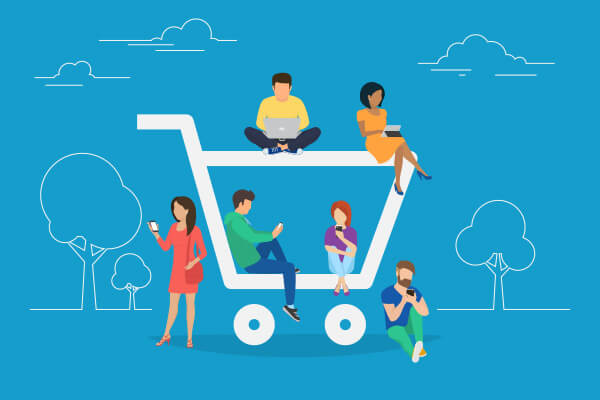Did you know that, for the consumer, the quality of care is more important than the price of the product or service?
According to research by the Small Business magazine, Big Business, about 61% of consumers take more into account the way they receive care than the quality or price of the product.
This is not a novelty, since many entrepreneurs understand that good service and attention are essential for the business, especially when the topic is sales generation.
And, by understanding that, companies are investing more and more in processes, systems and training to improve the organization’s relationship with the customer.
The problem is that sometimes all that is not enough. And the reason is simple: people are different, and consumers need different care according to their needs and characteristics.
Thinking like this, it seems impossible to please everyone, right? And well maybe it is! But you can achieve success with most of your clients.
For that, you must be able to identify the profile of each one of them.
Below, we will give you advice on how this contact can be more productive from the most common types of clients. Join us:
Indecisive client
The indecisive customer generally feels insecure after making a purchase. Start wondering if you really need the product, if the item is exactly what you are looking for or if your business is the best place to make the purchase.
In short: he raises various objections that hinder the completion of the sale.
We know that the undecided are difficult for the seller, but in these situations the best way to convince them is by focusing on the customer’s need, and not on the product itself. Check out some tips.
- Before all, ask a few questions to find out what he is really looking for.
- Present a support material demonstrating more about the product.
- If possible, demonstrate the item by showing its operation and effectiveness.
- Reassure him, transmitting confidence and showing him that he is making an excellent purchase.
- Let him analyze better, but be available in case you need help.
- If the customer still refuses to complete the purchase, talk to him and show him how bad it will be to postpone the purchase of the item.
Confused customer
The confused customer has a vague idea of what he wants to buy. For example: in a situation you need to give a friend a gift but you cannot express what you would like.
The key word at the time is patience. Ask simple questions to better understand.
Then, it is interesting to limit the number of options that you have available in the store and choose those that are more aligned with the information given by the consumer.
Determined customer
It seems that a determined customer cannot bring many problems when finalizing a purchase, right? Not always!
As this type of consumer is already aware of what they want, they generally have a vast knowledge of the product, and probably went through several competitors and are in your store to close business.
Therefore, a simple “false step” can make you give up and make the purchase from another company.
Therefore, there are some tips when serving you:
- Listen more, talk less.
- Let the customer make the decision on the best time to finalize the purchase. Don’t push it.
- As the customer already knows a lot about the product, it is better that you present the item in a short and objective way.
- In addition to quick demos, it uses more technical language with information that the customer may not yet know.
Nervous and rude customer
The nervous client is one of the most difficult to deal with. After all, you need to have the ability to get out of difficult situations and stay in control, so that his aggressiveness doesn’t interfere with your attention.
Generally this type of consumer argues for anything, whether for relevant reasons or those that are of little importance. In other words, everything becomes a matter of possible discussion .
But you should not despair when this feared client appears. There are some ways to treat it that help your care and facilitate the sale.
- Let the client speak, that can help him release his anger. Avoid interrupting it, otherwise it can make you more nervous.
- Never say or imply that he is very nervous, as this is also a reason for him to become more irritated.
- Try to calm him down with phrases like “you’re right” or “I’ll do my best to solve his problem.” They work well at that time.
- Be agile and efficient during the sale.
- Continue to use the right tone of voice, even if he is screaming.
Vain and critical customer
Do you know that customer who does not accept opinions and always wants to show that he knows more than the seller ? That is the famous and vain critic.
This is another type of consumer that is very difficult to deal with and, with him, calm and tolerance are essential in care. Furthermore, it is necessary that:
- Give him all the attention he wants.
- Avoid getting into arguments or giving reasons for it. Remember that he believes he is always right.
- Try to offer solutions to the problems he mentions.
- It shows purchase suggestions and not conclusions of what to bring.
- In the end, he tries to give the customer the impression that the decision about all aspects of the purchase came from him.
Client negotiator
The negotiating client is very recurring. The strongest characteristic of this type is wanting to get an advantage at all costs.
That means that he will only carry a product if he feels that in some way he is benefiting more than other consumers in the purchase.
The advice in this case is simple: it provides the necessary attention to the client, clarifying all his doubts, presenting suggestions and being open to negotiations.
But it is important to have a limit and not give in to all the customer’s offers. After all, profit from the sale is essential, and the price is relative to the quality of the product or service.
Expedited customer
Do you know that customer who has a heavy routine and during the purchase is always looking at the clock, showing impatience and agitation ? This is the rush.
This type of client is difficult, since you need to be very fast in the attention making it difficult for you to convince them to choose the purchase due to the lack of time in arguing and demonstrating the product.
- Serves the customer in his time. If you ignore this, he is likely to leave your store as quickly as possible empty-handed.
- Generally, the rushed customer goes to the store determined. Therefore, he soon attends to what he wants, without showing other options that do not have much to do with what he is looking for.
- Don’t waste time detailing the product. Look at what he needs and try to be as agile and assertive in the demonstration of the product and in the process of closing the purchase.
- You will need to be quick in giving him the product information, right? This being the case, it prioritizes the indispensable, such as that which is mandatory in relation to some specific law.
- If there is an impediment to the purchase that can be left aside, leave it!
Slow and detailed customer
Unlike the hurried one, the customer in a hurry is generally methodical and thinks twice before making any purchase.
And for this reason, it tends to be quite detailed, questioning everything about the product.
In addition to being more difficult to persuade, since it sticks to all the details, it can also interrupt the development of the sale because it has a good time of attention.
Thus, it is necessary for the seller to avoid unnecessary comments that harm the purchase process .
The number of options should also be limited, thus not causing indecision in the consumer.
Communicative client
This type of customer seems to be easy to serve, after all, he is usually friendly and humorous.
The problem is that, as well as the customer in a hurry, he can make the sales process more delayed, taking away valuable time that could be used to serve more people.
In addition to that, it is not because of his more pleasant personality that the sale is guaranteed. Many sellers have that feeling, but like other types of customers, the communicative also needs you to use your persuasive power and optimal attention.
For the communicative consumer, it is essential that you act like him, always courteous, but that he does not lend himself to matters that are not related to the sale. This, of course, appropriately.
Remember that the focus should be the quick resolution of your needs so that the sale is as agile as possible.













